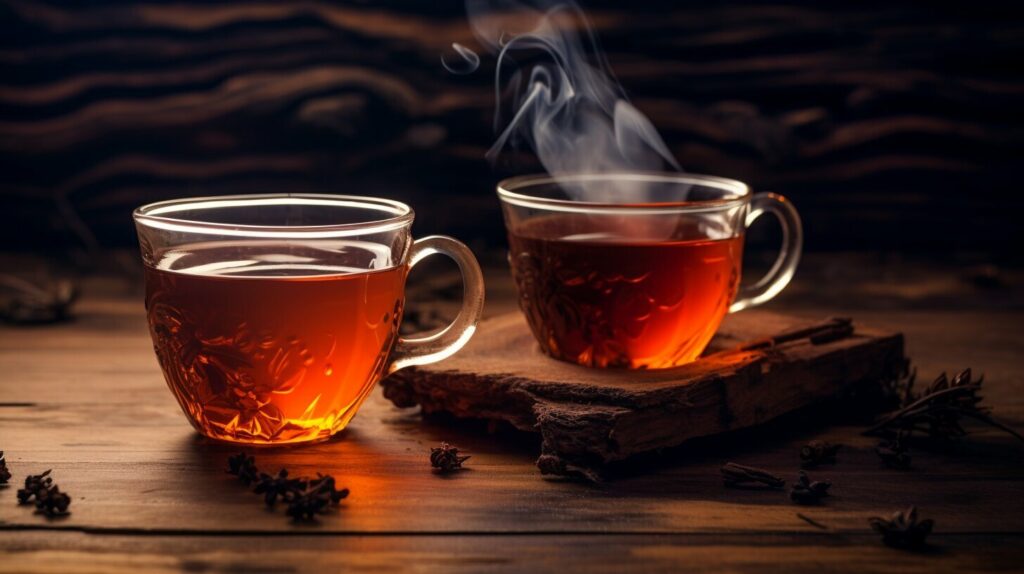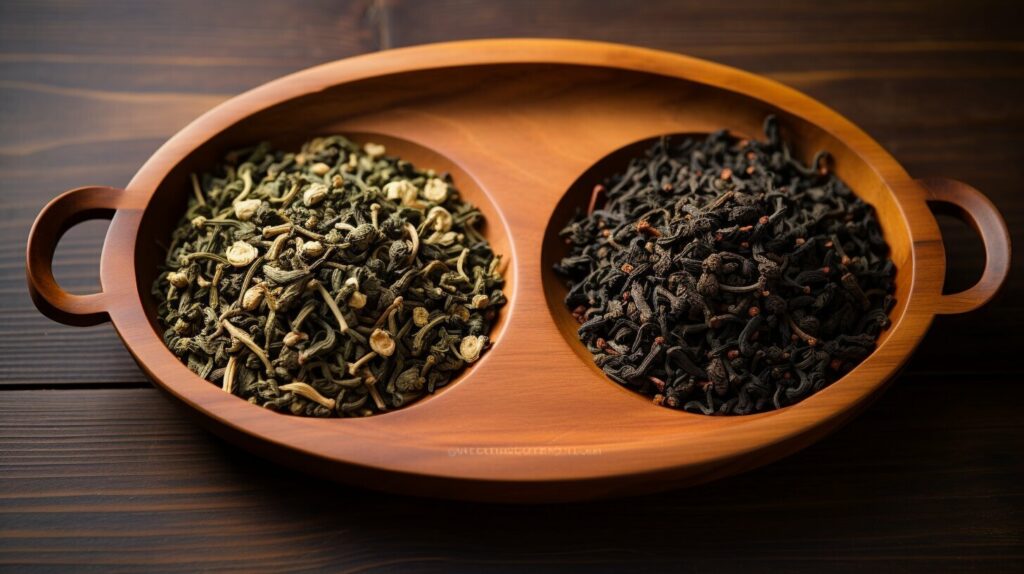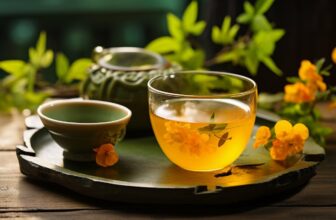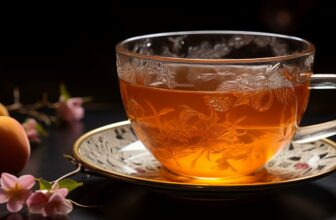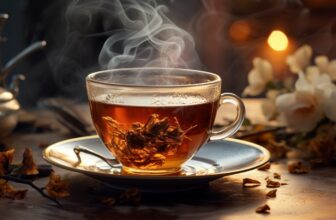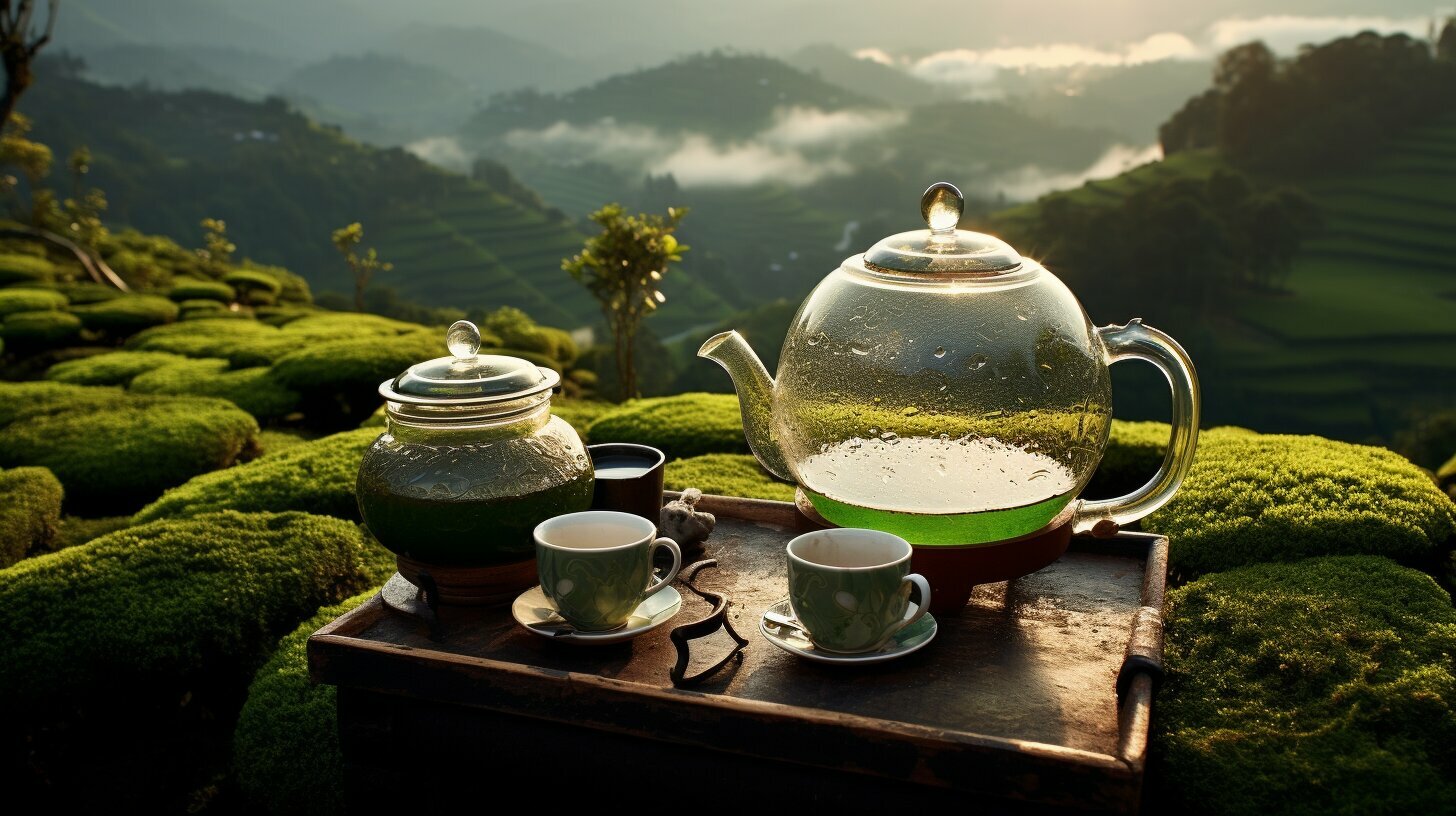
Tea is the second most consumed beverage in the world after water. Oolong tea is made from the same plant as black and green tea, but it undergoes partial oxidation during processing. Oolong tea contains high concentrations of polyphenols and antioxidants, which have been linked to various health benefits. Green and oolong teas are more commonly consumed in Oriental countries, while black tea is preferred in Western countries. Despite its popularity, there is a lack of comprehensive research on the health benefits of oolong tea compared to green and black teas.
Key Takeaways:
- Oolong tea is made from the same plant as black and green tea but undergoes partial oxidation.
- Oolong tea contains high concentrations of polyphenols and antioxidants.
- Research on the health benefits of oolong tea compared to green and black teas is limited.
- Green and oolong teas are more commonly consumed in Oriental countries, while black tea is preferred in Western countries.
- Further studies are needed to determine if oolong tea is healthier than black tea.
The Health Benefits of Oolong Tea
Oolong tea has gained popularity in recent years due to its potential health benefits. This traditional Chinese tea is known for its unique taste and aroma, but it also offers a range of advantages for overall well-being.
1. Weight Loss: Oolong tea has been linked to weight loss due to its ability to increase metabolism and promote fat oxidation. Studies have shown that regular consumption of oolong tea can help in achieving and maintaining a healthy body weight.
2. Brain Function: Thanks to its caffeine and L-theanine content, oolong tea can enhance brain function and improve cognitive abilities. It provides a natural source of energy and promotes mental alertness.
3. Bone Health: Oolong tea may contribute to improved bone density and strength, reducing the risk of fractures. The antioxidants present in oolong tea help in protecting bone cells and promoting overall bone health.
4. Disease Prevention: Research suggests that oolong tea has potential anticancer properties and may help in reducing the risk of certain types of cancer. It also shows promise in preventing type 2 diabetes and improving blood sugar control. Additionally, oolong tea has been found to have positive effects on oral health and skin irritations.
With its numerous health benefits, oolong tea is a beverage worth incorporating into your daily routine. Just remember to consume it in moderation and consult with a healthcare professional if you have any underlying health conditions.
Comparing Oolong Tea and Black Tea
Oolong tea and black tea are both popular choices for tea lovers around the world. While they may come from the same plant, their distinct processing methods and chemical compositions result in different flavors and health benefits.
Health Benefits:
Both oolong tea and black tea offer a range of health benefits, but they contain different types and levels of beneficial compounds. Oolong tea is rich in catechins, a type of antioxidant that has been shown to have numerous health-promoting properties. Black tea, on the other hand, undergoes full oxidation, leading to higher levels of polymeric polyphenols.
The specific health benefits of each tea vary. Oolong tea has been associated with weight loss, improved brain function, and promotion of bone density. It may also lower the risk of type 2 diabetes, protect against certain types of cancer, and have positive effects on oral health and skin irritations.
Black tea, on the other hand, has been linked to improved gut health, heart health, and blood sugar regulation. It may also have antimicrobial and anti-inflammatory effects.
Taste and Flavor:
Oolong tea is known for its delicate and complex flavors, ranging from floral and fruity to toasty and woody. Its taste can vary depending on the oxidation level and processing technique. Black tea, on the other hand, is characterized by its robust and bold flavor, often described as malty or earthy.
Caffeine Content:
Both oolong tea and black tea contain caffeine, but their caffeine levels differ. Generally, black tea has higher caffeine content than oolong tea. If you’re sensitive to caffeine or trying to limit your intake, oolong tea may be a better choice.
Conclusion:
When it comes to choosing between oolong tea and black tea, it ultimately depends on your personal preference and health goals. Both teas offer unique flavors and a range of potential health benefits. Whether you’re looking for a light and delicate tea or a bold and robust brew, exploring the world of oolong tea and black tea can be an exciting and enjoyable journey.
| Oolong Tea | Black Tea | |
|---|---|---|
| Flavor and Taste | Delicate and complex | Robust and bold |
| Health Benefits | Weight loss, improved brain function, bone density, lower risk of type 2 diabetes, cancer protection, oral health, skin irritations | Gut health, heart health, blood sugar regulation, antimicrobial, anti-inflammatory |
| Caffeine Content | Lower | Higher |
The Potential Side Effects of Oolong Tea
Oolong tea, like any other beverage, may have potential side effects when consumed in excess or by individuals with certain health conditions. It’s important to be aware of these risks and side effects to make informed decisions about your tea consumption.
Caffeine Sensitivity: Oolong tea contains caffeine, which can have stimulating effects on the nervous system. While moderate caffeine intake is generally safe for most people, individuals who are sensitive to caffeine may experience side effects such as anxiety, headaches, and an irregular heartbeat. If you are sensitive to caffeine or have a preexisting heart condition, it is recommended to limit your oolong tea consumption or opt for decaffeinated varieties.
High Blood Pressure: Due to its caffeine content, oolong tea may temporarily increase blood pressure. Individuals with hypertension or other cardiovascular conditions should exercise caution when consuming oolong tea and consult with their healthcare professional to determine a safe level of consumption.
Potential Oxidative Stress: Oolong tea contains polyphenols, which are known for their antioxidant properties. However, excessive consumption of polyphenols can lead to oxidative stress, a condition in which there is an imbalance between antioxidants and free radicals in the body. This may increase the risk of certain health conditions, including esophageal cancer. It is important to consume oolong tea in moderation and within the recommended daily limits.
| Risks and Side Effects of Oolong Tea |
|---|
| Caffeine Sensitivity |
| High Blood Pressure |
| Potential Oxidative Stress |
Individuals with underlying health conditions, such as gastrointestinal disorders or kidney problems, should also exercise caution when consuming oolong tea, as it may interact with certain medications or exacerbate symptoms of these conditions. It’s always best to consult with a healthcare professional before making any significant changes to your diet or beverage consumption.
The Impact of Oolong Tea on Autophagy
Autophagy, a cellular process that helps remove damaged cells and recycle cellular components, has gained significant attention in the field of health and wellness. Research suggests that autophagy plays a crucial role in various aspects of human health, including disease prevention and longevity. Recently, there has been growing interest in understanding the impact of oolong tea on autophagy and whether it can enhance this beneficial cellular process.
Oolong tea, known for its unique flavor and potential health benefits, has shown promise in preclinical studies as a potential modulator of autophagy. Some studies have suggested that the bioactive compounds present in oolong tea, such as catechins and polyphenols, may activate autophagy pathways and promote its beneficial effects. However, it is important to note that the existing research on this topic is limited, and more studies are needed to fully understand the relationship between oolong tea and autophagy.
While the preliminary findings are intriguing, it is important to approach the potential impact of oolong tea on autophagy with caution. It is recommended to consult with a healthcare professional or a qualified expert before making any significant dietary changes or incorporating oolong tea specifically for the purpose of enhancing autophagy. Additionally, it is crucial to maintain a balanced and varied diet, as well as a healthy lifestyle, which encompasses regular physical activity and adequate sleep, to support overall cellular health and promote optimal autophagy function.
Table: Potential Impact of Oolong Tea on Autophagy
| Benefits | Evidence |
|---|---|
| Potential enhancement of autophagy | Preliminary studies suggest a possible activation of autophagy pathways by oolong tea compounds. |
| Disease prevention | Autophagy plays a crucial role in disease prevention, and modulating autophagy may have potential health benefits. |
| Longevity | Research on autophagy and longevity is ongoing, and further exploration is needed to establish a definitive link. |
In conclusion, while oolong tea shows promise as a potential modulator of autophagy, more research is needed to fully understand its impact on this cellular process. It is always advisable to consult with healthcare professionals for personalized guidance and to rely on a holistic approach to health, which includes a balanced diet and a healthy lifestyle.
The Popularity and Future of Oolong Tea
Oolong tea, with its unique flavor and potential health benefits, is steadily gaining popularity worldwide. As more scientific research is conducted and awareness of its health benefits grows, oolong tea consumption is expected to continue increasing. This trend is evident in both Oriental and Western countries, as people look for alternative beverages that offer both taste and potential health advantages.
One reason for the growing popularity of oolong tea is its rich history and cultural significance. Originating in China, oolong tea has been consumed for centuries and holds a special place in traditional Chinese tea ceremonies. As tea culture spreads around the world, more people are becoming interested in exploring different varieties of tea, including oolong.
The future of oolong tea looks promising, as the market for this beverage continues to expand. With more tea producers recognizing the value of oolong tea and catering to consumer demand, a wider range of choices is becoming available. This includes various flavors, blends, and organic options, offering consumers the ability to select the oolong tea that suits their preferences and health goals.
Key Statistics: Oolong Tea Consumption
| Country | Annual Oolong Tea Consumption (in metric tons) |
|---|---|
| China | 80,000 |
| Taiwan | 20,000 |
| Japan | 10,000 |
| United States | 5,000 |
| South Korea | 3,000 |
These statistics provide a glimpse into the global consumption of oolong tea, with China leading the way as the largest consumer. However, the popularity of oolong tea is not limited to Oriental countries. In the United States, oolong tea is gaining traction as consumers become more health-conscious and seek out natural alternatives to traditional beverages.
As oolong tea continues to captivate taste buds and garner attention for its potential health benefits, it is likely that its popularity will continue to rise. With ongoing research, expanded market access, and growing consumer interest, the future of oolong tea looks bright.
Oolong Tea vs Black Tea: A Comparison
When it comes to choosing between oolong tea and black tea, it’s important to understand the differences and consider your personal preferences and health goals. Both types of tea offer unique characteristics and potential health benefits. Let’s explore the advantages of black tea and how it compares to oolong tea.
Advantages of Black Tea
Black tea, known for its rich flavor and bold taste, has its own set of advantages. One of the significant benefits of black tea is its higher caffeine content compared to oolong tea. If you are looking for a natural pick-me-up, black tea’s caffeine boost can be invigorating. Moreover, black tea contains theaflavins and thearubigins, which are unique compounds formed during the oxidation process. These compounds have been associated with potential health benefits, such as promoting cardiovascular health and reducing the risk of heart diseases.
Additionally, theaflavins found in black tea have antioxidant properties that may help protect against certain types of cancers. Black tea is also known for its potential to improve gut health and digestion. It has been suggested that the polyphenols in black tea can support the growth of beneficial gut bacteria, leading to a healthier digestive system.
Comparing Oolong Tea and Black Tea
While oolong tea and black tea offer their own advantages, they differ in their processing methods and chemical composition. Oolong tea undergoes partial oxidation, resulting in a tea that falls between the characteristics of green tea and black tea. On the other hand, black tea is fully oxidized, giving it a more robust flavor.
In terms of health benefits, both types of tea have been associated with various positive effects. Oolong tea is known for its potential to aid in weight loss, improve brain function, and promote bone density. It has also shown promise in blood sugar management, cancer prevention, and oral health. However, further research is needed to fully understand and compare the health benefits of oolong tea and black tea.
| Oolong Tea | Black Tea | |
|---|---|---|
| Caffeine Content | Medium | High |
| Oxidation Level | Partial | Full |
| Flavor | Mild and floral | Robust and bold |
| Potential Health Benefits | Weight loss, improved brain function, bone density, blood sugar management, cancer prevention, oral health | Cardiovascular health, reduced risk of heart diseases, cancer prevention, gut health |
Ultimately, the choice between oolong tea and black tea comes down to personal preference and individual health goals. Whether you prefer the mild and floral taste of oolong tea or the bold flavor of black tea, both can be enjoyed in moderation as part of a healthy lifestyle. It’s always a good idea to consult with a healthcare professional if you have any specific health concerns or conditions.
“The choice between oolong tea and black tea ultimately comes down to personal preference and individual health goals.”
Conclusion
In conclusion, oolong tea has shown promising potential in providing various health benefits. It has been linked to weight loss, improved brain function, and strengthened bones. Additionally, oolong tea may have positive effects on blood sugar management, cancer prevention, and oral health. However, it is essential to note that further research is necessary to validate these findings and determine the optimal consumption levels.
As the popularity of oolong tea continues to grow, more scientific studies are likely to emerge, shedding light on its potential health benefits and how it compares to other types of tea, such as black tea. It is important to consume oolong tea in moderation and consider individual sensitivities to caffeine and other compounds. Remember, the choice between oolong tea and black tea ultimately depends on personal preference and individual health goals.
As we uncover more about oolong tea and its effects on our well-being, it is clear that this unique beverage holds promise in providing a refreshing experience along with potential health benefits. So, if you’re looking for a flavorful alternative to your regular tea choices, give oolong tea a try and see how it enhances your daily routine!
FAQ
Is oolong tea healthier than black tea?
Oolong tea and black tea offer different health benefits, and it is difficult to determine which one is healthier. Both types of tea have their unique qualities and chemical compositions. It ultimately depends on personal preference and individual health goals.
What are the health benefits of oolong tea?
Oolong tea has been associated with various health benefits, including weight loss, improved brain function, stronger bones, blood sugar management, cancer prevention, and positive effects on oral health.
How does oolong tea compare to black tea?
Oolong tea and black tea come from the same plant but undergo different processing methods, resulting in different chemical compositions. Oolong tea contains higher levels of catechins, while black tea has higher levels of polymeric polyphenols. Both types of tea offer health benefits, but more research is needed to determine which one is healthier.
Are there any side effects of consuming oolong tea?
Oolong tea contains caffeine, so excessive consumption may lead to side effects such as anxiety, headaches, and an irregular heartbeat. It is also important to consume oolong tea in moderation if you have hypertension. Additionally, excessive consumption of polyphenols, found in oolong tea, may increase oxidative stress and potentially increase the risk of esophageal cancer.
Does oolong tea have any impact on autophagy?
Some research suggests that oolong tea may have an impact on autophagy, a cellular process linked to numerous health benefits. However, more research is needed to fully understand the relationship between oolong tea and autophagy.
How popular is oolong tea and what does the future hold?
Oolong tea is gaining popularity worldwide, thanks to its unique flavor and potential health benefits. As more scientific research is conducted and awareness grows, oolong tea consumption is likely to continue increasing. The market for oolong tea is expanding, with more producers and consumers recognizing its value.
What is the conclusion of the oolong tea vs black tea debate?
The choice between oolong tea and black tea ultimately comes down to personal preference and individual health goals. While both types of tea offer health benefits, more research is needed to determine which one is healthier.
